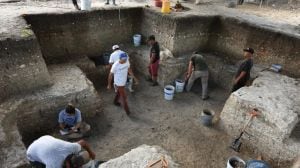In latest book,Cong tests Sanjay positive
The commemorative volume,Journey of a Nation: Indian National Congress; 125 Years,edited by Commerce Minister Anand Sharma,was on Thursday made public
In what betrays the Congresss dilemma about its stance on Sanjay Gandhi during the Emergency,a book brought out by the ruling party avoids any negative references to the younger son of the late Indira Gandhi and writes about his contribution to the party during the 1980 Lok Sabha elections in a positive light.
The commemorative volume,Journey of a Nation: Indian National Congress; 125 Years,edited by Commerce Minister Anand Sharma,was on Thursday made public before a select audience at a function here attended by Sharma,Delhi Chief Minister Sheila Dikshit,Haryana CM Bhupinder Singh Hooda,among others. Though the coffee table book was released by Prime Minister Manmohan Singh and Congress president Sonia Gandhi at the partys plenary last month,it was not circulated till Thursday.
Sanjay Gandhi through the Youth Congress outlined his four-point programme,which laid emphasis on literacy,environment protection and slum clearance. He laid the foundation for the peoples car,Maruti, says the book in a chapter dealing with the tenure of former PM Indira Gandhi.
Talking about Indiras comeback to power in the 1980 general elections,it further adds,Sanjay Gandhi mobilised the Youth Congress to garner support for the party.
This description of Sanjays role is in sharp contrast to the one portrayed in a previous party publication,Congress and the Making of the Indian Nation,which had talked about his arbitrary and authoritarian manner that had annoyed popular opinion during Emergency.
That book,edited by Finance Minister Pranab Mukherjee,said Sanjay had emerged as a leader of great significance and it was due to his support to family planning initiative that the government decided to pursue it more vigorously. He also promoted slum clearance,anti-dowry measures and promotion of literacy but in an arbitrary and authoritarian manner much to the annoyance of the popular opinion, it had said.
The new book refrains from attributing any action during Emergency to any individual. In the months following the proclamation of the Emergency,inflation,which had reached 30 per cent,was brought under control. Food and essential commodities were made readily available. Industrial production increased and the country enjoyed favourable foreign exchange reserves. However,curbs on freedom of expression and personal liberties aroused great opposition. Population control and slum clearance programmes were deeply resented by the people, it says.
In the foreword to the new publication,Sonia Gandhi states,The Congress could hardly have nurtured our democracy without an important internal attribute its tradition of argument. It has never been a monolith,but a capacious umbrella of different views,perspectives,and interests competing with one another. The Congress history is full of the contest of ideas and the clash of personalities,even sometimes resulting in splits. The first was in 1907. There have been others in our own lifetime. I believe these debates and differences have been a necessary part of the partys process of renewal,preventing stagnation in its thinking and keeping it relevant and responsive to changing circumstances.






- 01
- 02
- 03
- 04
- 05

























